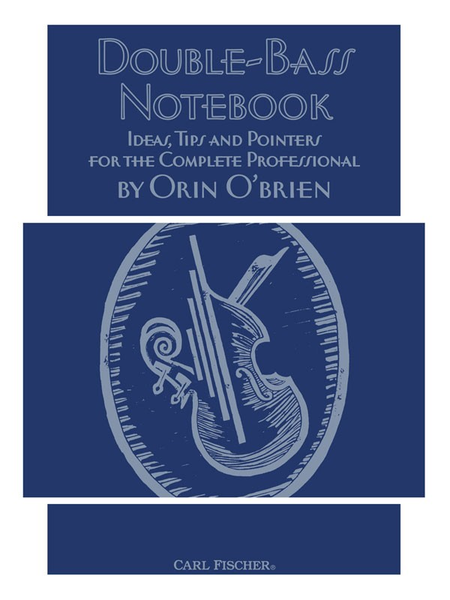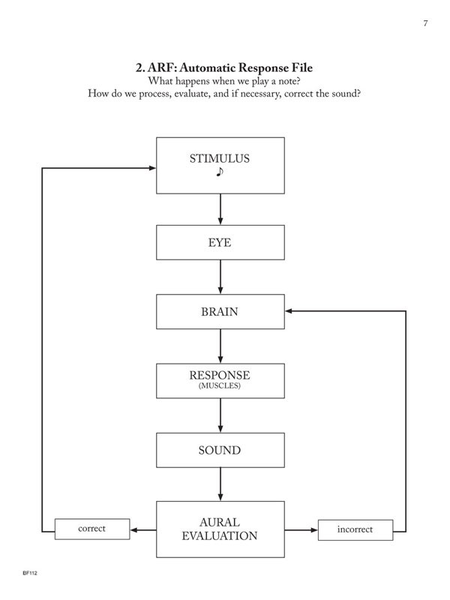Double-Bass Notebook
Ideas, Tips and Pointers for the Complete Professional
-
Ships in 1 to 2 weeks
Details
Description
SKU: CF.BF112
Ideas, Tips and Pointers for the Complete Professional. Composed by Orin O'Brien. Edited by Orin O'Brien. Spiral. Book (spiral-bound). With Standard notation. 96 pages. Carl Fischer Music #BF112. Published by Carl Fischer Music (CF.BF112).ISBN 9780825888830. UPC: 798408088835. Text: Orin O'Brien.
Highly-esteemed pedagogue and virtuoso Orin O’Brien offers alifetime of insight in her acclaimed String-Bass Notebook: Ideas, Tipsand Pointers for the Complete Professional. Originally only availablethrough special orders and by word-of-mouth, Carl Fischer isproud to premiere an updated and newly typeset edition of thisindispensable tool. This volume draws together musical examplesand intuitive texts which O’Brien has integrated as an essential partof her teaching studio. Works spanning from Zimmermann andSimandl to articles from contemporary colleagues form a strong anddefinitive compendium. Practical advice is given on topics such aspracticing and learning the instrument, as well as professional adviceon auditioning and repertoire. As a groundbreaking performer (firstfemale section-member of the New York Philharmonic), O’Briencontinues to nurture as an author and teacher. This volume is, asDonald Palma writes in the foreword, “a sharing of valuable resourcesfrom our past and present, resources that can help to make us betterperformers, better artists, and help us reconnect to our traditions.”.
Webster’s dictionary defines “tradition” as “the handing down of statements, beliefs, legends,customs, etc. from generation to generation especially by word of mouth or by practice; along-established or inherited way of thinking or acting.” As double bassists we are proudlypart of a centuries-old tradition of string playing. During the latter half of the nineteenthcentury our more recent ancestors generated schools of playing that addressed the technicaladvances necessary to prepare students for the rigors of the more complex compositionalstyles and consequently more difficult double bass-part writing of the day. The operas andtone poems of Richard Strauss, the symphonies of Bruckner and Mahler and the advancedorchestrations of Schoenberg and Berg challenged double bassists in ways heretoforeunexplored.The traditions of the author of this indispensable volume, Orin O’Brien, began indirectlywith Franz Simandl, his pupil Ludwig Manoly, whom Dvořák brought to America and whowas principal bass at the New York Philharmonic, and then continued directly through theteaching of Herman Reinshagen (associate principal bass at the New York Philharmonicduring Mahler’s time as Music Director) and Frederick Zimmermann. I was very fortunatein my formative years to have been able to study with Frederick Zimmermann, briefly.When Zimmermann passed away, I was welcomed to study with Orin O’Brien. Thepositive, nurturing environment of her studio cannot be exaggerated. In addition to beingtaught how to negotiate our noble instrument in a beautiful and musical way, students wereimmersed in the culture of our art: examining scores, listening to recordings, discussingstylistic differences and sharing our experiences and concerns. We were instilled with a deepsense of responsibility: the responsibility of always playing one’s best and of bringing all ourtalents and abilities to bear when performing. We were also taught respect: respect for thecomposer’s intentions, the conductor’s directives and respect for our colleagues.Now this wonderful volume brings all of these elements together and provides studentand teacher alike with a practical compendium of the essentials necessary for the developmentof the musician double bassist. It is an inspired work compiled over many years of performingand teaching at the very highest level. There are no tricks or technical gimmicks and noself-aggrandizing. There is only a sharing of valuable resources from our past and present,resources that can help to make us better performers, better artists and help us reconnect toour traditions.


 Share
Share